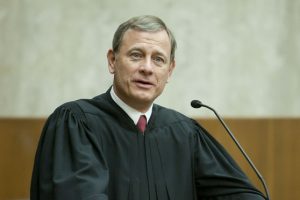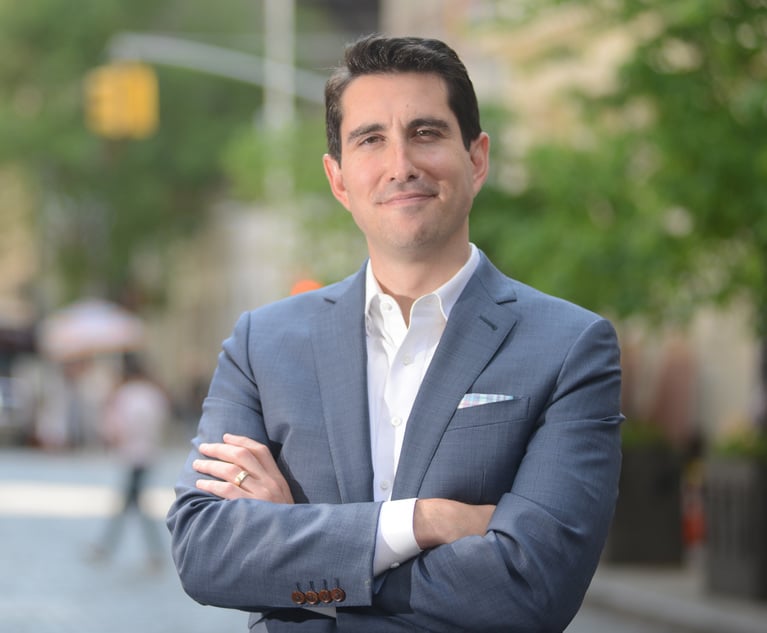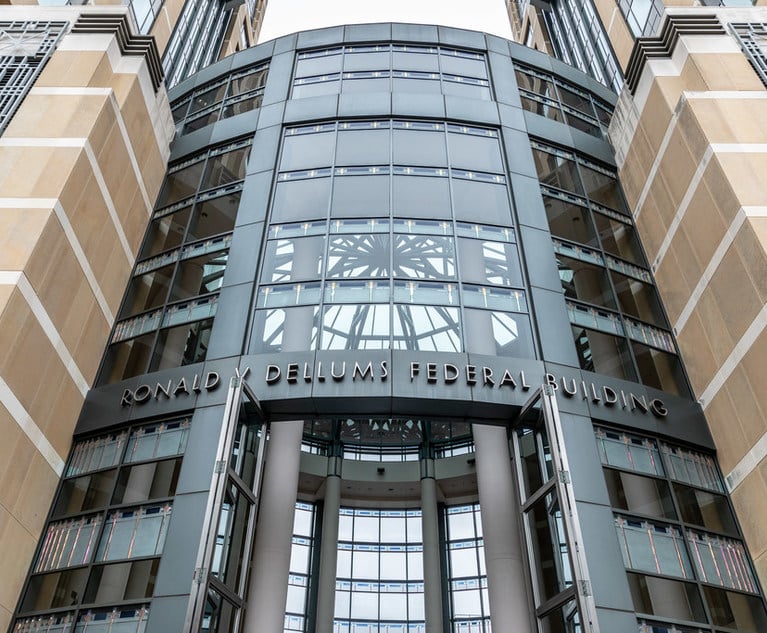Justice Clarence Thomas Stirs Up a First Amendment Squabble Over Libel Law
"We should not continue to reflexively apply this policy-driven approach to the Constitution," Justice Clarence Thomas wrote. "If the Constitution does not require public figures to satisfy an actual-malice standard in state-law defamation suits, then neither should we."
March 29, 2019 at 09:33 AM
7 minute read

Imagine, for a moment, what would happen if President Donald Trump or other like-minded public officials traded in their Twitter accounts for a new weapon in the ongoing war against the news media: suing journalists and news organizations for libel.
For decades, media lawyers and journalists had little reason to worry about such a scenario, thanks to the 1964 Supreme Court decision New York Times v. Sullivan. To foster "uninhibited, robust, and wide-open" debate, the court required that public officials filing libel lawsuits must prove that the defamatory statements at issue were made with "actual malice," a standard that made it almost impossible for public figures to mount and win libel lawsuits.
But on Feb. 19, Justice Clarence Thomas wrote an unexpected opinion that unsettled that sense of security. Always the originalist, Thomas wrote that nothing in the text of the First Amendment required the standard applied in the New York Times case, so the precedent should be reconsidered.
"We should not continue to reflexively apply this policy-driven approach to the Constitution," Thomas wrote. "If the Constitution does not require public figures to satisfy an actual-malice standard in state-law defamation suits, then neither should we."
The statement instantly worried Davis Wright Tremaine partner Katherine Bolger, who counts on Sullivan "every day of my life" as a First Amendment litigator in New York representing media organizations facing libel lawsuits. Protecting the press from ruinous lawsuits, she said, "is really important in our republic, and to hear it questioned, it's nerve-racking, because we're in a climate where the president is calling the press the 'enemy of the people.'"
Sonja West, a University of Georgia School of Law professor and former Supreme Court law clerk, told NPR that if Sullivan were overturned, "It might become nearly impossible for many, if not even most, news organizations to continue to report on the government with the same kind of close scrutiny that we've come to expect. There would be a very big risk of a chilling effect among, in particular, the press but, really, all government critics."
Not everyone thought Thomas was wrong to raise the issue.
"Some kind of chilling effect is not the worst idea, because it reduces the risk that falsehoods will destroy people's reputations," Harvard Law School professor Cass Sunstein wrote in a Bloomberg opinion column. "And in this context, the idea of democracy is a double-edged sword. If a speaker lies about a politician, and destroys her reputation in the process, democracy is not exactly well-served."
But Ballard Spahr senior counsel Lee Levine, co-author of a book about Sullivan, said, "From where I sit, the vital importance of Sullivan continues." Levine, like others, was troubled by Thomas' statement, though he clings to hope that the precedent won't be overturned. "Every fiber in my body is telling me no," he said.
 U.S. Supreme Court Justice Clarence Thomas
U.S. Supreme Court Justice Clarence ThomasThat optimism is fueled by the fact that no other justice joined Thomas' opinion, which was filed in the case of McKee v. Cosby, brought by Katherine McKee who claimed that comedian Bill Cosby raped her. She said that a lawyer for Cosby retaliated by defaming her in a letter that was leaked. But her suit was dismissed because she was deemed to be a "limited-purpose public figure." That finding triggered the application of Sullivan and would have required McKee to meet the "actual malice" standard—in other words, prove that the statement was made with knowledge that it was false or with reckless disregard of whether it was false or not.
Another development also gave media advocates reason to believe that the high court won't follow Thomas' advice anytime soon.
During a Feb. 6 conversation at Belmont University College of Law in Tennessee, Chief Justice John Roberts Jr. made this startling statement: "I don't know where you put conservative or liberal in the First Amendment area, but I think I'm probably the most aggressive defender of the First Amendment on the court now. I think most people might think that doesn't quite fit with my jurisprudence in other areas."
 U.S. Chief Justice John Roberts Jr. Credit: Diego M. Radzinschi / National Law Journal
U.S. Chief Justice John Roberts Jr. Credit: Diego M. Radzinschi / National Law JournalJustice Anthony Kennedy was often described as the Supreme Court's First Amendment champion, but now that he has retired, Roberts seemed eager to fill the void. If that is the case, overturning Sullivan, one of the most important First Amendment decisions of the 20th century, is not likely to top Roberts' to-do list. New Justices Neil Gorsuch and Brett Kavanaugh have also not shown enthusiasm to bury the precedent.
But Thomas' solo complaint was still significant, because it marked the first time in decades that Sullivan was under the court's microscope.
The late Justice Antonin Scalia frequently criticized the precedent, but he stopped short of trying to overturn it. As recently as January, the Supreme Court denied review in another case that asked the justices explicitly to overturn the Sullivan precedent.
"I can't recall a serious effort to overturn Times v. Sullivan since the Falwell case," Levine said. He was referring to Hustler Magazine v. Falwell, a 1988 ruling in which conservative Chief Justice William Rehnquist shielded the Sullivan precedent from attack.
Ever since then, the area of libel and defamation law was largely left alone as the justices tended to other lines of doctrine. By urging re-examination of libel law, whether he is successful or not, Thomas has stirred up a First Amendment controversy that few were anticipating.
Thomas' suggestion also struck fear in some litigators' hearts because it aligned with the views of Trump. On the campaign trail in 2016, Trump said, "I'm going to open up our libel laws so when they write purposely negative and horrible and false articles, we can sue them and win lots of money … instead of having no chance of winning because they're totally protected."
Thomas' reference to state-law libel litigation harkened back to the days before 1964, when most libel lawsuits were litigated in state courts without the kind of federal constitutional guidelines that Sullivan and other Supreme Court rulings provided.
Without that federal overlay, Davis Wright's Bolger said, news media and other critics would be subject to state-level "random justice," depending on where the suit was filed.
"In some states, like New York, I think that nothing would practically change," Bolger said. "I think the New York legislature, the New York courts, would quickly act to protect the press, because that's what we do in New York. That's not what we do everywhere, and I think that's the harm."
She gave an example of the damage that might occur. Soon after Thomas made his statement, The New York Times published a story that chronicled Trump's "war" against various investigations that are underway. Trump, without evidence, tweeted that the story was false, and declared the Times was "a true ENEMY OF THE PEOPLE."
If Trump sued instead of tweeted, and if the Sullivan ruling were no more, Bolger said the burden of proof would shift to the defendant, and "you'd have to fight through discovery for something that's clearly false. You'd have to litigate that case to enormous expense."
That kind of scenario, she added, would force news organizations to "make the decision—do I publish, or am I too afraid of this lawsuit and I don't publish? There is serious harm if that story doesn't get published."
This content has been archived. It is available through our partners, LexisNexis® and Bloomberg Law.
To view this content, please continue to their sites.
Not a Lexis Subscriber?
Subscribe Now
Not a Bloomberg Law Subscriber?
Subscribe Now
NOT FOR REPRINT
© 2025 ALM Global, LLC, All Rights Reserved. Request academic re-use from www.copyright.com. All other uses, submit a request to [email protected]. For more information visit Asset & Logo Licensing.
You Might Like
View All
Crypto Entrepreneur Claims Justice Department’s Software Crackdown Violates US Constitution
4 minute read
Kraken’s Chief Legal Officer Exits, Eyes Role in Trump Administration
3 minute read
Crypto Exchange’s ‘Meteoric Rise’ Leads to Nationwide Class Action Trend
4 minute read
Trending Stories
Who Got The Work
J. Brugh Lower of Gibbons has entered an appearance for industrial equipment supplier Devco Corporation in a pending trademark infringement lawsuit. The suit, accusing the defendant of selling knock-off Graco products, was filed Dec. 18 in New Jersey District Court by Rivkin Radler on behalf of Graco Inc. and Graco Minnesota. The case, assigned to U.S. District Judge Zahid N. Quraishi, is 3:24-cv-11294, Graco Inc. et al v. Devco Corporation.
Who Got The Work
Rebecca Maller-Stein and Kent A. Yalowitz of Arnold & Porter Kaye Scholer have entered their appearances for Hanaco Venture Capital and its executives, Lior Prosor and David Frankel, in a pending securities lawsuit. The action, filed on Dec. 24 in New York Southern District Court by Zell, Aron & Co. on behalf of Goldeneye Advisors, accuses the defendants of negligently and fraudulently managing the plaintiff's $1 million investment. The case, assigned to U.S. District Judge Vernon S. Broderick, is 1:24-cv-09918, Goldeneye Advisors, LLC v. Hanaco Venture Capital, Ltd. et al.
Who Got The Work
Attorneys from A&O Shearman has stepped in as defense counsel for Toronto-Dominion Bank and other defendants in a pending securities class action. The suit, filed Dec. 11 in New York Southern District Court by Bleichmar Fonti & Auld, accuses the defendants of concealing the bank's 'pervasive' deficiencies in regards to its compliance with the Bank Secrecy Act and the quality of its anti-money laundering controls. The case, assigned to U.S. District Judge Arun Subramanian, is 1:24-cv-09445, Gonzalez v. The Toronto-Dominion Bank et al.
Who Got The Work
Crown Castle International, a Pennsylvania company providing shared communications infrastructure, has turned to Luke D. Wolf of Gordon Rees Scully Mansukhani to fend off a pending breach-of-contract lawsuit. The court action, filed Nov. 25 in Michigan Eastern District Court by Hooper Hathaway PC on behalf of The Town Residences LLC, accuses Crown Castle of failing to transfer approximately $30,000 in utility payments from T-Mobile in breach of a roof-top lease and assignment agreement. The case, assigned to U.S. District Judge Susan K. Declercq, is 2:24-cv-13131, The Town Residences LLC v. T-Mobile US, Inc. et al.
Who Got The Work
Wilfred P. Coronato and Daniel M. Schwartz of McCarter & English have stepped in as defense counsel to Electrolux Home Products Inc. in a pending product liability lawsuit. The court action, filed Nov. 26 in New York Eastern District Court by Poulos Lopiccolo PC and Nagel Rice LLP on behalf of David Stern, alleges that the defendant's refrigerators’ drawers and shelving repeatedly break and fall apart within months after purchase. The case, assigned to U.S. District Judge Joan M. Azrack, is 2:24-cv-08204, Stern v. Electrolux Home Products, Inc.










